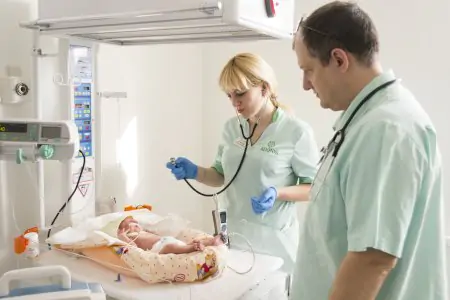
Pour les partenaires
Sécurité Patient
Sécurité Patient



Voir toutes les photos
Ukraine
Kyiv 
FIV + don d'ovules (3+3 ovules décongelés, 2 donneuses)
ADONIS Fertility Center
Ukraine Kyiv
89% des clients recommandent cette clinique
note de Excellent basée sur 28 avis de patients Lire les avis Fertility specialist
Tetiana Sheplyakova
À propos
Dr. Tetiana Sheplyakova, MD, is an experienced obstetrician-gynecologist and fertility specialist. She has 13 years of clinical practice. She holds an “A” specialist qualification. Dr. Sheplyakova earned her medical degree from the National Medical University named after M. Gorky. She later specialized in Ultrasound Diagnostics at the National Pirogov Medical University.
Dr. Sheplyakova has worked at leading centers such as the Donetsk Regional Centre for Maternal and Child Health and ADONIS Medical Group. She has participated in over 20 international conferences and workshops in obstetrics, gynecology, perinatology, and reproductive medicine. She is dedicated to ongoing professional development and provides evidence-based care.
Détails du programme
Un spécialiste hautement qualifié avec 13 ans d'expérience vous propose ICSI + FIV avec ovules décongelés, 2 donneuses, diagnostic complet, hébergement à l'hôtel et transfert aéroport-hôtel-clinique-aéroport.
En savoir plus sur les avantages du programme
Procédures Médicales
- Fécondation In Vitro (FIV)
- Comprehensive couple diagnosis before IVF
Hébergement
Two-bed ward
Transport
Transfer airport-hotel-clinic-airport
Informations complémentaires
Medical services:
IVF with ICSI +EGGS DONATION with the medicines cost (3+3 thawed eggs, 2 donors):
Preparing of endometrium of Patient
Medical supply of endometrium preparing in Cryoprotocol
Vitrificated donor’s eggs (3+3 oocytes)
Thawing of oocytes
Preparation of sperm for IVF program
Intracytoplasmic sperm injection (ICSI)
Cultivation of embryos in IVF program, including till blastocyst stage (by needs)
Embryos transfer (ET) in Patient`s uterus cavity in IVF program
Cost of embryological supply of TVP
Cost of embryological supply of ET
Blood test on Human chorionic gonadotropin (beta-hCG)
Ultrasound diagnostics of pregnancy in terms up to 11th weeks
Blood sampling
Cryopreservation and storage of sperm during 1 year
Vitrification of embryos
Storage of embryos (1 year)
Additional cryothek (*up to quantity of embryos)
Non-medical services:
Selection of Ooctyes donor
Selection of Sperm`s donor
Translation of Patients` documents for Medical Center (passports, marriage certificate)
Coordination Services of Egg Donation Program
Free 2nd medical opinion
Assistance Bookimed 24/7
Coordinateur médical personnel
Organisation de voyage médical — réservation des tickets de vol et des chambres d'hôtel à des prix réduits pour les partenaires
Prise en charge du patient lors d'un voyage médical
Avis des patients
1 étoiles
0%
2 étoiles
0%
3 étoiles
0%
4 étoiles
0%
5 étoiles
100%
Le tarif global de ADONIS Fertility Center comprend
Médecin
personnel
Établissements
Support linguistique
Support
5 déc. 2023
Avis vérifié.
Toutes les informations ont été fournies avec compétence et précision. Je suis satisfait des conclusions du médecin.
Compétence du médecin
À propos du service bookimed
J'ai reçu une réponse rapide à toutes mes questions.
Show original
YUliya • Fécondation In Vitro (FIV) Ukraine
10 mars 2024
Avis vérifié.
Наталья • Fécondation In Vitro (FIV) Allemagne
9 févr. 2024
Avis vérifié.
Тамара • Fécondation In Vitro (FIV) Ukraine
2 nov. 2022
Avis vérifié.
Localisation
26К Dniprovska Naberezhna str, Kyiv, Ukraine, 02000
FAQ
Technologies de procréation assistée en FIV
Les technologies de procréation assistée (ART) comprennent :
- insémination intra-utérine avec sperme;
- ICSI (ICSI) - injection de spermatozoïdes dans la coquille de l'ovule ;
- IMSI (IMSI) - injection d'un spermatozoïde sélectionné (le plus sain) dans un ovule ;
- TESA (TESA) - aspiration (biopsie) de plusieurs sections des testicules ;
- TESE (TESE) - prélèvement de tissu testiculaire pour la recherche ultérieure de spermatozoïdes viables ;
- cryoconservation (congélation) d'ovules, de spermatozoïdes et d'embryons ;
- don d'ovules, de sperme et d'embryons;
- mère de substitution.
La FIV, comme d'autres méthodes de traitement de l'infertilité utilisant l'ART, est pratiquée par des médecins en ambulatoire.
Qu'est-ce qui est inclus dans le programme complet de fécondation in vitro dans les cliniques partenaires de Bookimed ?
Souvent, un programme de FIV comprend :
- consultation avec un obstétricien-gynécologue, embryologiste ;
- stimulation de l'ovulation;
- recevoir des œufs (ponction);
- fécondation d'œufs matures;
- culture d'embryons (généralement 5 jours) ;
- transfert d'embryons (blastocystes) dans l'utérus.
Avant et après la FIV, la patiente suit un traitement hormonal spécialement sélectionné.
À la fin de la deuxième semaine après le transfert des embryons, la femme subit un test de grossesse et, en cas de résultat positif, une échographie.
Dans la plupart des cas, les médecins combinent la FIV avec d’autres techniques de procréation médicalement assistée. Par exemple, le transfert de blastocyste (au 5ème jour du développement embryonnaire) augmente les chances de réussite de l'implantation et réduit le risque de grossesses multiples. Et le diagnostic génétique préimplantatoire des embryons permet d'éviter un certain nombre d'anomalies chromosomiques.


